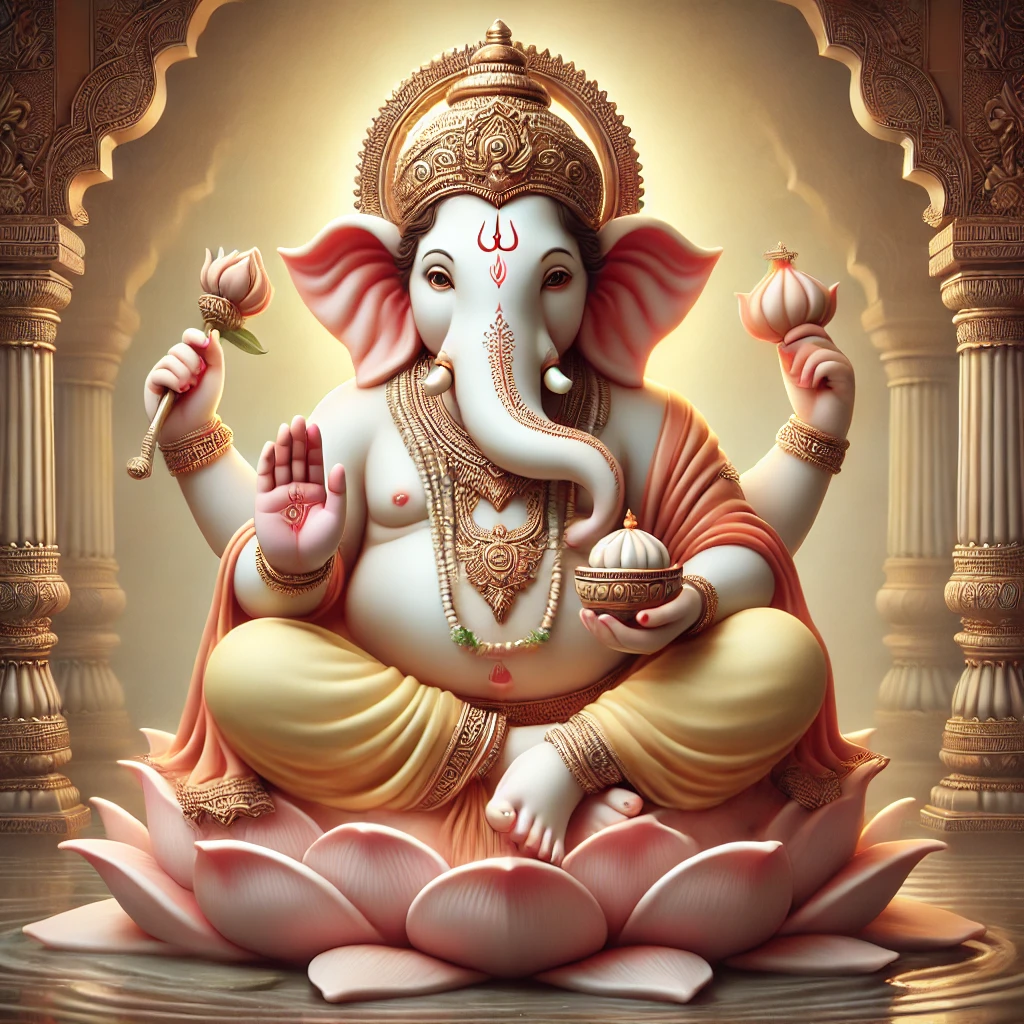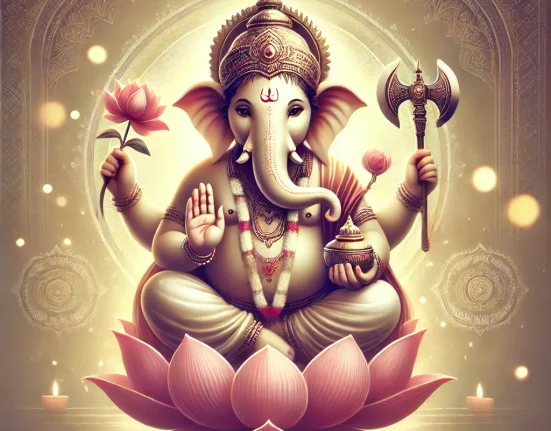Introduction
When you walk into a Hindu temple, one of the first deities you’ll likely encounter is Lord Ganesh—also known as Ganapathi or Vinayagar. His unmistakable elephant head, plump figure, and kind eyes are a familiar and beloved symbol in Hinduism. But who exactly is Lord Ganesh, and why does he hold such a revered place in the hearts of millions around the world?
Lord Ganesh is much more than just a widely recognized figure; he embodies wisdom, prosperity, and the removal of obstacles. In this blog, we will explore his origin, significance, and the impact he has on devotees. We’ll also dive into various facets of Ganesh worship, anecdotes from history, and insights from scriptures to provide a full understanding of his divine role.
The Origins of Lord Ganesh
Lord Ganesh is one of the most popular deities in Hinduism, but his origin story is as fascinating as it is complex. According to Hindu scriptures, he is the son of Lord Shiva, the destroyer, and Goddess Parvati, the divine mother.
The Birth of Ganesh
The most well-known version of Ganesh’s birth is told in the Shiva Purana. Goddess Parvati, wishing to have a personal guard while she bathed, created Ganesh out of the turmeric paste she had applied to her body. She breathed life into the figure and instructed him to stand guard at the entrance. When Lord Shiva returned and tried to enter, Ganesh—unaware of who Shiva was—blocked his way. Angered, Lord Shiva severed Ganesh’s head. Upon realizing what had happened, a grief-stricken Parvati demanded that her son be brought back to life. Shiva, to make amends, attached the head of an elephant to the boy’s body and restored him to life. Thus, Ganesh, with his elephant head, was born anew.
This tale illustrates not only Ganesh’s origin but also his role as the protector and remover of obstacles. His very existence is tied to the resolution of a monumental conflict, which reflects his primary function in the lives of devotees.
Why is Ganesh Worshipped First?
One of the most remarkable aspects of Ganesh is that he is worshipped before all other deities during any Hindu ritual. This custom is rooted in mythology and his divine responsibilities. As the “Vighnaharta” (remover of obstacles), it is believed that invoking Ganesh’s blessings first ensures a smooth journey in any endeavor—be it a wedding. A new business venture, or even daily prayers.
The Importance of Ganesh in Hindu Rituals
Ganesh’s role as the remover of obstacles is best illustrated by a well-known story. Once, the great sage Vyasa was about to compose the Mahabharata, one of the longest epic poems in history. Realizing the complexity of the task ahead, Vyasa requested Ganesh’s assistance. Ganesh agreed to transcribe the verses, but only if Vyasa would recite without pause. Vyasa, in turn, stipulated that Ganesh must fully understand each verse before writing it down. The result was a perfect balance, ensuring that every line of the epic was thoughtfully crafted.
This anecdote not only shows Ganesh’s sharp intellect but also his role as a deity who ensures that monumental tasks are undertaken with care, patience, and wisdom.
Symbolism and Iconography of Lord Ganesh
Ganesh’s distinctive appearance is packed with deep symbolism. Every aspect of his form conveys a message, offering spiritual lessons for devotees.
The Elephant Head
Ganesh’s elephant head represents wisdom, strength, and discernment. In Hindu culture, elephants are seen as intelligent creatures, capable of navigating dense forests—a metaphor for life’s complex challenges. Similarly, Ganesh helps his devotees navigate through the ‘forest’ of obstacles.
The Broken Tusk
Ganesh is often depicted with a single broken tusk. This too carries significance. The broken tusk symbolizes sacrifice and the willingness to endure personal loss for the greater good. This is tied to the story of Ganesh breaking his tusk to continue writing the Mahabharata when his quill broke mid-task.
The Large Belly
Ganesh’s round belly is not merely a playful feature—it symbolizes contentment and the ability to peacefully digest all that life brings, whether joy or sorrow.
These symbolic features teach us that life is full of challenges, but with wisdom, sacrifice, and contentment, we can overcome them.
Ganesh’s Influence Across the World
While Ganesh is deeply rooted in Hindu culture, his influence transcends the boundaries of India. Today, Ganesh is worshipped in various forms across the globe, including in countries like Sri Lanka, Nepal, Thailand, and Indonesia. In fact, his popularity has grown among non-Hindus as well. With his image being associated with good luck, prosperity, and success.
In Sri Lanka, for instance, Lord Ganesh—locally referred to as Vinayagar—is a common sight in both Hindu and Buddhist temples. The overlapping spiritual traditions highlight Ganesh’s universal appeal as a protector and guide.
Ganesh’s Role in Contemporary Life
In recent times, there are countless anecdotes of how devotees have turned to Ganesh for support. From students seeking his blessings before important exams to entrepreneurs invoking him before launching a business, his presence is pervasive in everyday life.
Take the example of a successful business owner in Sri Lanka, who attributes his company’s rise to the blessings of Ganesh. He recalls praying to Ganesh during a difficult financial phase, and within months, the tide turned in his favor, leading to remarkable growth. This story resonates with many who seek divine help in overcoming life’s uncertainties.
Is Ganesh’s Worship Truly Necessary?
While Ganesh worship is widespread, some may question whether it is essential in the modern world. Skeptics argue that focusing on practical solutions rather than divine intervention yields better results. However, devotees counter that Ganesh worship provides spiritual strength and peace, which fuels personal and professional success.
It’s important to note that Ganesh is not merely a deity to be appeased for material gain. Instead, his role extends into fostering inner wisdom and a calm mind. Worshippers often report that turning to Ganesh in times of stress leads to better decision-making and clearer paths forward. Regardless of the immediate outcome.
The Ever-Present Lord Ganesh
Ganesh, with his elephant head, broken tusk, and large belly, is more than just an iconic figure. He is a symbol of wisdom, perseverance, and success. Whether you are embarking on a new journey, facing difficulties, or simply seeking clarity in life, Ganesh stands as a protector and guide, removing obstacles from your path.
From his origin story to his role in modern life, Ganesh remains a deeply revered figure across the world. His universal appeal lies not just in the promise of material success but in the deeper wisdom he represents—wisdom that guides us through life’s many challenges.
As you explore the rich tradition surrounding Ganesh, may his blessings bring wisdom, peace, and prosperity to your life. If you’re seeking spiritual accessories to connect deeper with Lord Ganesh, visit spiritualguru.lk for a curated collection of items that enhance your devotion and practice.



Leave feedback about this